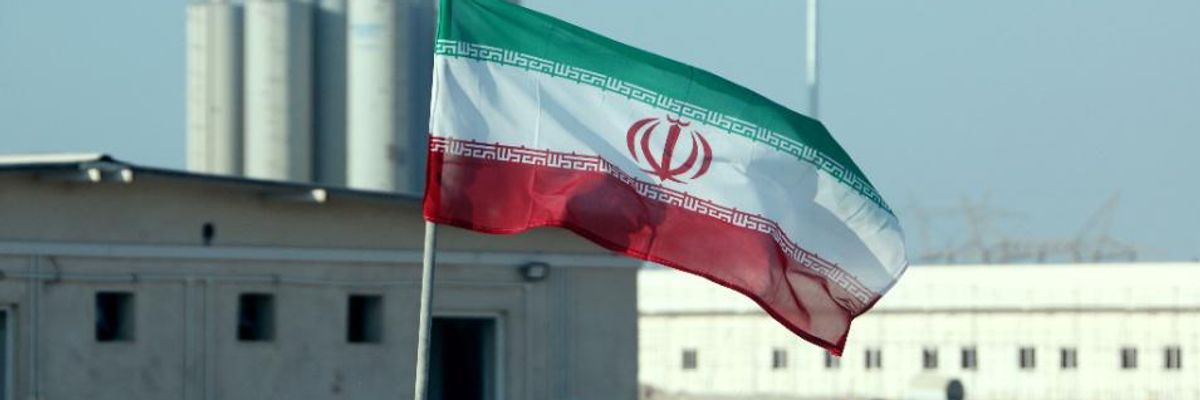Amid critical talks in Vienna, more than two dozen Senate Democrats on Tuesday sent a letter urging President Joe Biden to treat the United States' return to the Iran nuclear agreement as a top priority.
"While the damage of the last four years has left our country facing numerous challenges across the globe, there is no question that one of your early pressing national security priorities should be to return to the Joint Comprehensive Plan of Action (JCPOA) to address the threat of Iran's nuclear program," the letter (pdf) says, using the deal's formal name.
As a presidential candidate, Biden promised to rejoin the deal. The letter blasts former President Donald Trump's decision to withdraw from the JCPOA in May 2018 and pursue a "maximum pressure" strategy. It continues:
Other missteps of the Trump administration include banning Iranians from traveling to the United States and refusing to provide adequate and timely humanitarian licensing to ensure unencumbered delivery of humanitarian assistance to Iran, including for medicines and medical supplies necessary to aid innocent Iranians ravaged by Covid-19. We welcome your decision to reverse the travel ban and would support actions in line with U.S. values that you promised during the campaign to ensure that U.S. sanctions do not prevent the Iranian people from receiving critical vaccines and other medicines in the midst of a global pandemic.
The effort was spearheaded by Sens. Tim Kaine (D-Va.), a member of the Senate Foreign Relations and Armed Services committees, and Chris Murphy (D-Conn.), chair of the Senate Foreign Relations Subcommittee on Near East, South Asia, Central Asia, and Counterterrorism.
They were joined by Sens. Tammy Baldwin (D-Wis.), Michael Bennet (D-Colo.), Sherrod Brown (D-Ohio), Tom Carper (D-Del.), Bob Casey (D-Pa.), Tammy Duckworth (D-Ill.), Dick Durbin (D-Ill.), Dianne Feinstein (D-Calif.), Martin Heinrich (D-N.M.), John Hickenlooper (D-Colo.), Amy Klobuchar (D-Minn.), Ben Ray Lujan (D-N.M.), Patty Murray (D-Wash.), Chris Van Hollen (D-Md.), Patrick Leahy (D-Vt.), Ed Markey (D-Mass.), Jeff Merkley (D-Ore.), Jack Reed (D-R.I.), Bernie Sanders (I-Vt.), Brian Schatz (D-Hawaii), Tina Smith (D-Minn.), Debbie Stabenow (D-Mich.), Rev. Raphael Warnock (D-Ga.), Elizabeth Warren (D-Mass.), and Sheldon Whitehouse (D-R.I.).
"We strongly support returning to the JCPOA and using a 'compliance for compliance' approach as a starting point to reset U.S. relations with Iran. Should Iran be willing to return to compliance with the limitations set by the JCPOA, the United States should be willing to rejoin the deal and provide the sanctions relief required under the agreement," the lawmakers wrote.
"This return would also mark your administration's adherence to the congressional reporting requirements of the Iran Nuclear Agreement Review Act, ensuring that Congress is regularly informed of all aspects of Iranian compliance," the letter notes. "This includes your certification every 90 days that Iran is 'transparently, verifiably, and fully implementing' the agreement and that Iran has not taken any action to advance a nuclear weapons program."
"A 'compliance for compliance' policy will also help restore U.S.diplomatic credibility and repair relations with our European allies, who have continued to support the deal in our absence," the letter adds, further calling on Biden to "build on its initial mutual return with Iran to the JCPOA by promptly engaging in follow-on discussions on a regional diplomatic strategy to restrain Iran that involves not only the P5+1 but also Israel and the Gulf States."
The lawmakers' letter was welcomed by Ryan Costello, policy director at the National Iranian American Council (NIAC)--particularly in contrast to a separate letter led by Sens. Bob Menendez (D-N.J.), chair of the Senate Foreign Relations Committee, and Lindsey Graham (R-S.C.) that "unrealistically and unhelpfully" calls for "all problems to be resolved upfront."
"With important progress toward a synchronized return last week in Vienna, this important letter comes at a perfect time to show President Biden he has support from Congress to reseal the deal, and take other critical steps like supporting humanitarian trade with Iran," he said, noting that a clear majority of the Democratic caucus clearly recognizes that "Trump's maximum pressure policy was a resounding failure that brought us to the brink of war and pushed Iran to expand its nuclear program rather than curbing it as the JCPOA successfully accomplished."
Costello made the case that a compliance for compliance return and the call for ensuring that supplies to deal with the pandemic can reach Iranians are "perfectly in line with President Biden's own thinking."
"President Biden and his administration have been clear in their desire to restore the deal through mutual return to compliance, [and] the participation of the U.S. in indirect negotiations with Iran in Vienna show their commitment to that end," he said. "But with Iran's elections on the horizon in June the window to act is small."
"Returning to the deal would deliver immediate nonproliferation benefits, re-establish American leadership and credibility in world affairs, and create a foundation for further diplomacy to address other concerns with Iran," Costello said. "Such lasting benefits can't be delivered via sabotage that we have seen over the past year or rash military action, which risks poisoning the well for talks and convincing Iran to fortify and double down on its nuclear program."

